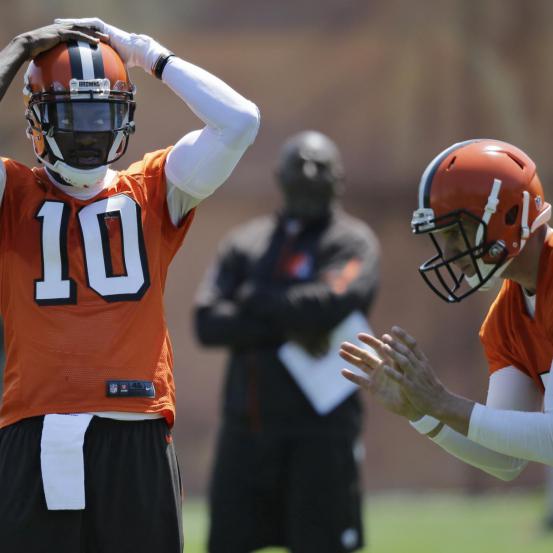- Commissioner’s statement on Ventura, Marte
- Ronnie O’Sullivan: Masters champion ‘felt so vulnerable’ in final
- Arron Fletcher Wins 2017 WSOP International Circuit Marrakech Main Event ($140,224)
- Smith challenges Warner to go big in India
- Moncada No. 1 on MLB Pipeline’s Top 10 2B Prospects list
- Braves land 2 on MLB Pipeline’s Top 10 2B Prospects list
- Kingery makes MLB Pipeline’s Top 10 2B Prospects list
- New Zealand wrap up 2-0 after Bangladesh implosion
- Mathews, Pradeep, Gunathilaka to return to Sri Lanka
- Elliott hopes for rain for Poli
The Do’s and Don’ts of NFL OTAs
- Updated: May 24, 2016

Robots. Grievances. Unexpected injuries. Quarterback controversies that will boil over before Memorial Day.
OTAs aren’t as easy for teams as they used to be.
Gone are the days when players lifted weights, blocked sleds, memorized plays and milled around team headquarters for a few weeks in the spring. Minicamps and OTAs have become minefields as coaches search for the best way to prepare players for the season without risking injury. Some teams have gone high-tech. Others have gone old school (too old school in some cases, according to the collective bargaining agreement). And no detail is too minute for the fans, who gobble up every nugget of news and are sure to blame that Week 7 loss on the time when coach gave the boys Thursday afternoon off in early June.
Minicamps are like snowflakes: No two are alike. But there are rules of thumb every team should follow to make a modern minicamp safe, efficient, contract-compliant and optimal to the needs of today’s players and NFL. Here are the do’s and don’ts:
DON’T name a starting quarterback if you don’t want to
“When you have a choice to make and don’t make it, that is in itself a choice.” So said William James. And who are we to question the father of sports analytics?
Oh wait, that was Bill James. William James was the 19th century philosopher who influenced everything from modern psychology to Rush lyrics. His school of thought was pragmatism, as in: You have to be pragmatic about your quarterback controversy, otherwise it will divide your locker room and define/ruin your season.
Browns head coach Hue Jackson has nothing to gain by naming a starting quarterback two months before the start of training camp. If he named Robert Griffin III the starter, it would send a message. If he named Josh McCown (or Cody Kessler or Connor Shaw) the starter, it would also send a message. The message that there is no starter also sends a message, but it’s the one Jackson wants to send: Options are open, expectations are in check, competition is crucial.
Chip Kelly has taken a similar approach, declaring on KNBR’s Murph and Mac show Friday that he has “no idea” who the 49ers starting quarterback will be (via CSNBayArea.com’s Matt Maiocco), couching the message carefully with Colin Kaepernick’s injury status. The Jets have also been mum, perhaps because their most obvious Week 1 starter is still a free agent.
The Eagles, meanwhile, have been forced to bend over backward to name Sam Bradford the starter while conceding that all three of their quarterbacks (Bradford, Carson Wentz and Chase Daniel) are splitting reps. If everyone is equally splitting reps, and “reps” consist of seven-yard out routes against air, why name anyone the starter? To soothe egos and unruffle feathers. You shouldn’t have to do that in May.
Once training camp begins, the beat writers can start publishing daily completion rates and snap-by-snap recaps of who got the first-team reps. Until then, coaches should keep an open mind, or at least pretend that’s what they are doing.
DON’T try to circumvent the OTA rules
The collective bargaining agreement forbids contact drills during OTAs and minicamps. They are unethical. They are counterproductive. Contact drills in early June do not “toughen the boys up,” no matter what your high school coach thought 30 years ago. They expose players to injury and health risks.
The NFL is investigating the Ravens for reportedly putting their rookies in full pads before a non-contact punt return drill during rookie camp. The team’s official story is that coaches did not realize they were violating the CBA, per ESPN.com’s Jamison Hensley, and that once they figured it out, they contacted a union rep and immediately had the rookies remove the pads.
Uh-huh. John Harbaugh doesn’t know the particulars of minicamp rules after nine years on the job.
The rules are so …
continue reading in source www.bleacherreport.com
